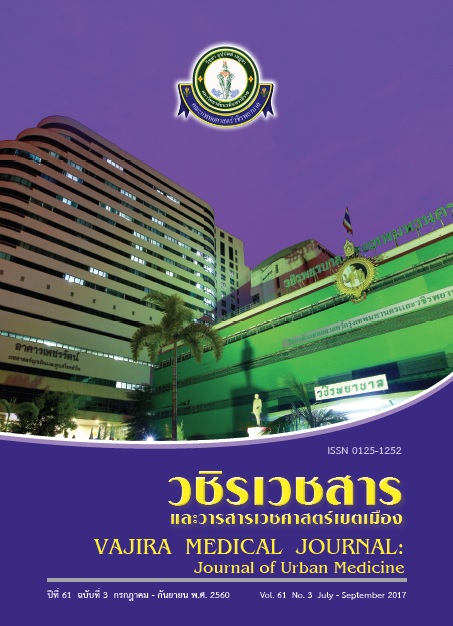Attitudes of Outpatients towards the Presence of Medical Students in Clinical Practice: A Cross-sectional Study
Main Article Content
Abstract
Objectives: To study outpatients’ attitudes toward medical students. The factors which may affect attitudes of patients including place, educational level, outcomes, health access choices, and experiences with medical students in the examination room were also evaluated.
Methods: This was a cross-sectional survey. The questionnaire was conducted among outpatients or their relatives in gynecology, medicine, surgical and parents of patients in pediatric clinics in January 2015. The recording data were age, sex, factors which may affect attitudes, and a questionnaire regarding patients’ attitudes toward medical students.
Results: One hundred and fifteen responders had a mean age of 44.2 + 15.9 years. More than two-third of responders lived in Bangkok, and about 50% had an educational level of bachelor’s degree or higher. Fifty-six percent of responders wanted the physician to ask them for permission before medical student involvement, and 40% did not want medical students to examine some body parts. The majority of participants (66%) were satisfied with the presence of medical students in the examination room, and more than 90% were willing to welcome medical students to the next visit. The most important factor affecting attitudes was educational level. The responders with an educational level of bachelor’s degree or higher wanted medical teachers to ask permission for students’ presence with odds ratio (OR) of 3.9 (95% confidence interval (CI) = 1.7-8.9; p=0.001), felt an invasion of privacy with OR of 4.3 (95% CI = 1.5-2.7; p=0.005), and did not want medical students to exam some organs with OR of 2.6 (95% CI = 1.5-2.7; p=0.005) compared with responders who achieved a lower level of education.
Conclusions: Outpatients’ attitudes towards medical students are positive. The majority of them are satisfied with medical students’ staying in the examination room. Permission should be sought from patients before medical student involvement. The most influential factor on patients’ attitudes regarding medical students is educational level.
Article Details
References
2. Patient’s right, Medical Council of Thailand. [internet]. 2016. [cited 2016 October 5] Available from: http://anaes1.md.kku.ac.th/view.php?qid=726.
3. Hartz MB, Beal JR. Patients’ attitudes and comfort levels regarding medical students’ involvement in Obstetrics-Gynecology outpatient clinic. Acad Med. 2000; 75: 1010-4.
4. Rogers HD, Carline JD, Paauw DS. Examination room presentations in general internal medicine clinic: Patients’ and students’ perceptions. Acad Med. 2003; 78: 945-9.
5. Isaacson JH, Neides D, Mayer M, Nottingham K. Patient Perceptions of Having 1st- and 2nd-year medical students involved in their care. Teach Learn Med. 2014; 26: 164-7.
6. Gress TW, Flynn JA, Rubin HR, Simonson L, Sisson S, Thompson T, et al. Effect of student involvement on patient perceptions of ambulatory care visits. J Gen Intern Med. 2002; 17: 420-7.

